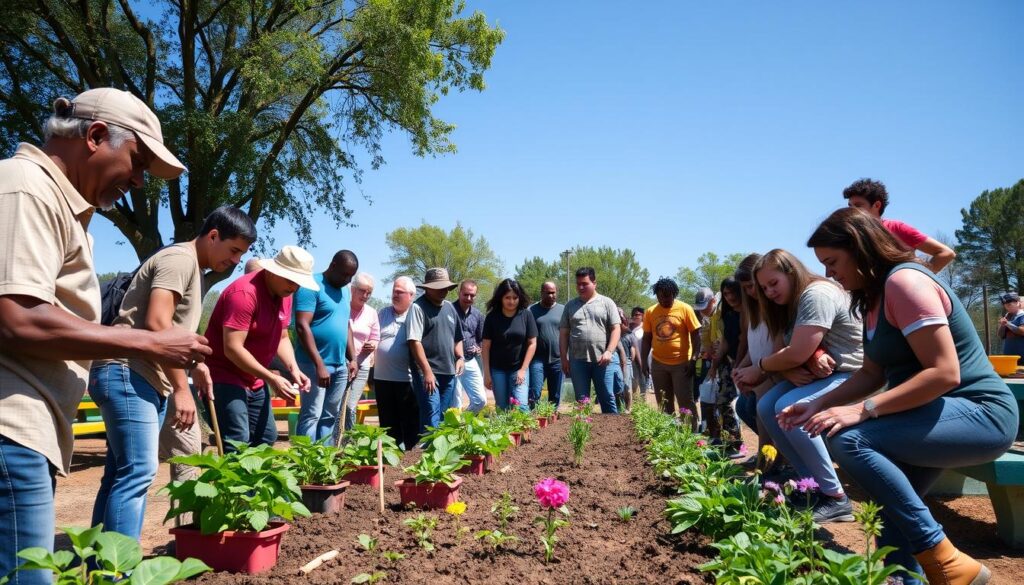Ever looked in the mirror and thought, “Am I a good person?” It’s a deep question many of us ask. We often feel we could do more to live up to our ideals. But, the truth is, being better doesn’t need big changes. It’s about the small, daily actions that build our character.
As adults, we make thousands of choices every day. This can make us forget what’s truly important. Daily routines help by making our lives more structured. This way, we can focus on growing and helping others.
Table of Contents
Becoming a better person isn’t about being perfect. It’s about making small, lasting changes. By adopting daily routines, we can live more ethically and positively, step by step.
Understanding the Foundation of Personal Growth
Personal growth is a journey that starts with a strong foundation. At its core is self-awareness, understanding your thoughts, emotions, and actions. This journey helps you become more compassionate, empathetic, and self-improved.
The Role of Self-Awareness in Personal Development
Self-awareness is key to personal growth. It lets you see your strengths, weaknesses, and patterns. With self-awareness, you can make better choices, improve relationships, and face challenges more easily. Regular self-reflection and mindfulness can boost your self-awareness and lead to personal change.
Building Strong Core Values
Strong core values are also crucial for personal growth. Your values guide your decisions and actions. By living in line with your values, you build integrity and authenticity, leading to a more fulfilling life.
Creating a Moral Compass
With self-awareness and core values, you can create a moral compass. This compass guides you through life’s complexities. It helps you make ethical choices, show compassion, and positively impact your community. By being mindful of your impact, you can make a difference in others’ lives.
“Dedication to personal growth is not about perfection, but about the courage to embrace the discomfort of change and the willingness to learn and grow.” – Faith Malton
Daily Habits That Shape Character
Building a strong character isn’t about big actions. It’s about the routine, discipline, and consistency in our daily habits. These habits are the base of personal development and growth.
Begin with small steps. Add habits like waking up at the same time or saying daily affirmations. Keep your “why” in mind to stay motivated.
- Involve others in your routines to foster accountability and strengthen relationships.
- Infuse your habits with joy and positivity to maintain consistency and discipline.
- Learn to gracefully say “no” to commitments that conflict with your priorities.
- Remain flexible and adaptable when life throws curveballs, adjusting your routine as needed.
By creating mindful daily habits, you build a character of poise, resilience, and integrity.
“We are what we repeatedly do. Excellence, then, is not an act, but a habit.” – Aristotle
Building lasting habits takes time. It might take two months for a new habit to stick. Focus on the 20% of efforts that give 80% of results. Stay focused and avoid distractions.
Creating meaningful daily routines sets the stage for a remarkable character. It’s built on discipline, consistency, and a dedication to personal development.
Be A Good Person Through Simple Actions
Becoming a good person is not about big actions. It’s the small, daily things that really count. By being kind, empathetic, and honest, you grow as a person. You also make a positive impact on those around you.
Practicing Random Acts of Kindness
Small acts of kindness can change lives. Studies show that kindness boosts happiness and life satisfaction. Doing something nice for someone, like buying their coffee, can spread joy.
Showing Empathy in Daily Interactions
Empathy lets you understand and share others’ feelings. Being respectful is key to being seen as a leader. By listening and showing compassion, you build stronger relationships.
Living with Integrity
Integrity means being honest and fair. When you act with integrity, you earn trust. This inspires others and helps your community.
By taking these simple steps, you start a journey of growth. You’ll make a real difference in people’s lives.
| Kindness Story | Impact |
|---|---|
| A 10-year-old made about 20 sandwiches for homeless individuals around Nashville. | This act of kindness and generosity provided sustenance and comfort to those in need, while also instilling a sense of community and compassion. |
| An FFA group from Hillsboro High School in Wisconsin took farm animals to visit an assisted living facility, Milestone Senior Living of Hillsboro, spreading kindness. | This thoughtful gesture brought joy and happiness to the residents of the assisted living facility, fostering connections and brightening their day. |
| A person witnessed an older lady asking for small change at a bus stop on the 29th of March. | This observation serves as a reminder that small acts of kindness, such as offering spare change, can make a significant difference in someone’s life and restore their dignity. |
“Integrity is the essence of everything successful.” – R. Buckminster Fuller
Developing Meaningful Relationships
Meaningful relationships are key to personal growth and happiness. Building strong connections needs communication, trust, and empathy. It takes time, effort, and a real interest in others.
In today’s digital world, feeling disconnected is common. Yet, social connections are crucial for happiness and support. A Harvard survey found 61% of young adults feel serious loneliness, compared to 39% of all adults.
To fight loneliness, balance digital and face-to-face interactions. Try coffee dates, walks, or hobbies together. Putting away your devices helps you connect more deeply.
“Emotional openness and vulnerability are crucial in fostering meaningful relationships, with 60% of respondents indicating that sharing what truly matters to them strengthens bonds.”
Building trust and closeness needs vulnerability. Share your thoughts and feelings to build understanding and support. Celebrate each other’s wins and listen well to strengthen your bond.
Creating meaningful relationships is a journey that needs effort and commitment. By focusing on communication, trust, and empathy, we grow personally and feel a sense of belonging.
Mindful Living and Self-Improvement
Embracing mindful living is a journey that changes you for the better. It helps you understand yourself and the world around you. By being present, you gain a deeper insight into your life and relationships.
Morning Routines for Personal Growth
Starting your day with mindful practices sets a positive tone. Activities like meditation, journaling, or gentle exercises ground you. They make you focused and ready to face the day with purpose.
Evening Reflection Practices
Reflecting at the end of the day is just as important. Reviewing your day, reflecting on growth, and being thankful helps. It boosts self-awareness and emotional processing, making you feel accomplished.
Cultivating Mindfulness
Mindfulness is at the core of mindful living. It can be through meditation, breathing exercises, or just being present. Mindfulness reduces stress and boosts well-being. It makes you more conscious and fulfilled.
“Mindfulness is about being fully awake in our lives. It is about perceiving the exquisite vividness of each moment. We also gain immediate access to our own powerful inner resources for insight, transformation, and healing.”
– Jon Kabat-Zinn
Embracing mindful living is a journey of self-discovery. It involves morning routines, evening reflection, and mindfulness. These practices help you find purpose, resilience, and connection with yourself and the world.
| Mindfulness Benefit | Impact |
|---|---|
| Increase in Positive Emotions | Greater Happiness Over Time |
| Feeling More Fulfilled in Experiences | Sense of Purpose and Fulfillment |
| Calmer and More Capable of Handling Stress | Quicker Recovery from Negative Experiences |
| Enhanced Resilience | Process Experiences with Self-Awareness |
| Improved Communication Skills | Better Understanding of Personal Wants and Needs |
Creating Positive Impact in Your Community
Being a good person is more than just personal growth and relationships. It’s about making a difference in your community. Getting involved in your community helps you feel connected, helps others, and shows you care.
Volunteering is a powerful way to change your community for the better. You can help at a food bank, clean parks, or mentor kids. Even small acts of kindness can inspire others, making your community kinder and more caring.
- Volunteer at local charities, non-profits, or community centers
- Participate in neighborhood clean-up initiatives or community gardens
- Mentor or tutor children in need of academic support
Supporting local businesses and organizations also helps your community. Shopping at small businesses boosts the local economy and shows you value hard work. Joining community events or groups that match your values is another way to help.
Thinking about how your actions affect the environment is key. Choosing eco-friendly options like recycling and saving water helps everyone. Encourage others to do the same.

Also, being positive online can make a big difference. Being kind and supportive online can inspire others and create a better online community.
By getting involved, volunteering, and caring for the environment, you can make a big difference. You’ll inspire others to do the same, creating a better community for everyone.
Overcoming Challenges with Grace
Life’s ups and downs test our resilience and adaptability. When faced with difficult situations, responding with grace is key. This approach matters in handling relationship issues, parenting, or health problems.
Handling Difficult Situations
Life throws challenges, like unwanted advice at family gatherings or relationship strains. Feeling overwhelmed is normal. Yet, responding with empathy and authenticity can ease tensions and build understanding.
Learning from Mistakes
Mistakes are part of life, and we’re not perfect. Instead of self-criticism, see them as chances to learn and grow. Reflect, learn from mistakes, and adjust your approach. This approach of self-compassion and humility helps you face challenges with grace.
Building Resilience
Building resilience is key to bouncing back and adapting. Practice gratitude, forgiveness, and generosity for a positive outlook. Surround yourself with support and seek help when needed. Focus on solutions and stay flexible to grow stronger from challenges.
| Graceful Response | Challenging Reaction |
|---|---|
| Staying calm, practicing acceptance, focusing on solutions, seeking support | Fear, anxiety, self-doubt, negative thinking, procrastination, worry over resources, perfectionism, burnout, blaming, judging, acting out |
| Maintaining perspective, practicing self-compassion, staying flexible, learning from setbacks, staying positive, practicing patience | N/A |
Embracing grace in tough times shows your strength and character. Cultivate resilience, problem-solving skills, and a growth mindset. This way, you can face life’s ups and downs with grace and grow into a more adaptable and capable person.
Nurturing Mental and Emotional Well-being
It’s key to focus on your mental and emotional health for your overall well-being. This means practicing self-care, growing your emotional intelligence, and handling stress well. Regular exercise, healthy food, and enough sleep help keep your mind clear and emotions stable.
Self-care is about doing things that make you feel good physically, mentally, and emotionally. Getting enough sleep, for instance, boosts your health. It’s also about setting limits in social life to take care of yourself.
Being emotionally smart means knowing and controlling your feelings and those of others. Mindfulness, like meditation, can cut down stress and lift your mood.
Managing stress is vital for your well-being. Celebrating your wins, no matter how small, boosts your self-care. Being close to family and friends also lowers stress and improves your mood.
Don’t forget, getting professional help when you need it is part of taking care of your mental and emotional health. By focusing on your well-being, you build a strong base for personal growth and happiness.

“Taking care of yourself is the most powerful way to begin to take care of others.” – Lao Tzu
Conclusion
Becoming a good person is a lifelong journey. It’s about growing and improving yourself. This means reflecting on yourself, building good habits, and making a difference in the world.
By following the advice in this article, you can start a journey of self-discovery. This journey will lead to a more fulfilling life.
The journey of personal growth is not straightforward. It’s a cycle of learning and changing. Use self-awareness to guide you through life’s challenges.
Surround yourself with people who support you. Live mindfully and find ways to help your community.
Being a good person means looking inward, being dedicated, and questioning yourself. Embrace this journey, celebrate your successes, and learn from your mistakes. With each step, you’ll grow and make a positive impact on others.
FAQ
What is the importance of daily routines for personal growth?
Daily routines are key for personal growth and reaching goals. They cut down on decision fatigue, as we make about 35,000 decisions a day. Routines give structure, manage time, and help develop good habits.
Starting small and being consistent helps build momentum for bigger tasks and goals.
Why is self-awareness crucial for personal development?
Self-awareness is vital for personal growth. It means knowing your thoughts, emotions, and actions. Building strong core values guides your decisions and actions.
Having a moral compass aligns your actions with your beliefs and society’s norms. These steps help you become a better person and grow.
What are the key strategies for developing effective daily habits?
Building daily habits shapes your character. Start small, wake up at the same time, and use affirmations. Remember why you’re doing it to stay motivated.
Involve others in your routines for accountability and stronger relationships. Adding joy to your routines keeps you consistent and disciplined. Learning to say no and being flexible are also key.
How can simple actions have a significant impact on becoming a better person?
Simple actions can greatly improve your character. Doing random acts of kindness creates positive effects. Showing empathy strengthens your connections with others.
Living with integrity means your actions always match your values. These practices help you grow and positively impact those around you.
What are the key components of meaningful relationships?
Meaningful relationships are essential for growth and happiness. Good communication, trust, and empathy are crucial. Spending time and showing genuine interest in others nurtures these relationships.
Strong social connections make us happier and offer support in tough times.
How can mindful living contribute to personal growth?
Mindful living means being present and aware every day. Morning routines set a positive day, while evening reflection helps process your day. Mindfulness, through meditation or other practices, boosts self-awareness and reduces stress.
These practices help in ongoing self-improvement and growth.
What are the benefits of creating a positive impact in the community?
Making a positive impact in your community is vital. This can be through volunteering, local events, or supporting initiatives. It fosters a sense of belonging and purpose while helping others.
How can handling challenges with grace contribute to personal growth?
Dealing with challenges shows personal growth. Handling tough situations with grace is a sign of growth. Learning from mistakes offers valuable lessons and chances to improve.
Building resilience helps you bounce back from setbacks and adapt to change. These skills make you stronger and more capable.
Why is prioritizing mental and emotional well-being crucial for personal growth?
Putting mental and emotional well-being first is key for health and growth. This includes self-care, emotional intelligence, and stress management. Regular exercise, good nutrition, and sleep improve mental clarity and emotional stability.
Seeking professional help when needed is also important for mental and emotional health.


It takes courage to grow up and become who you really are.